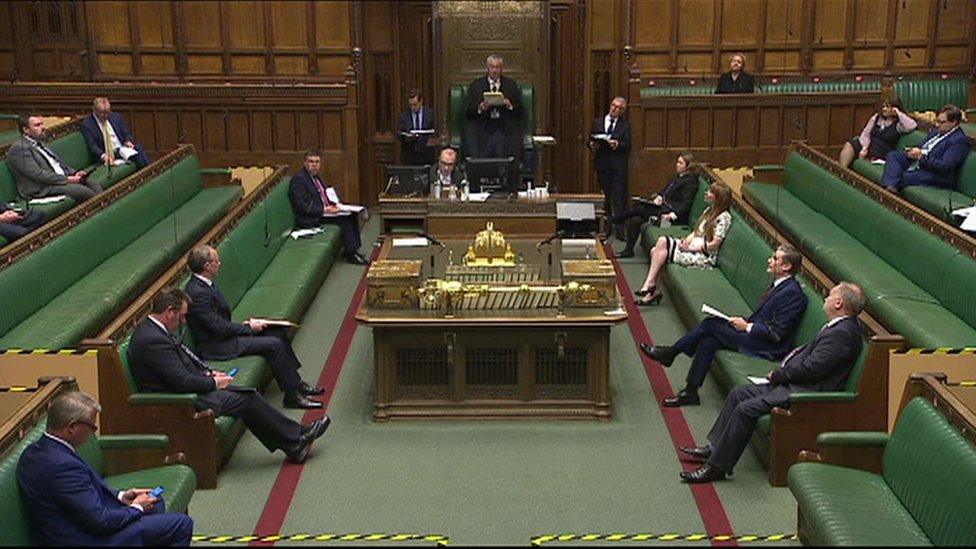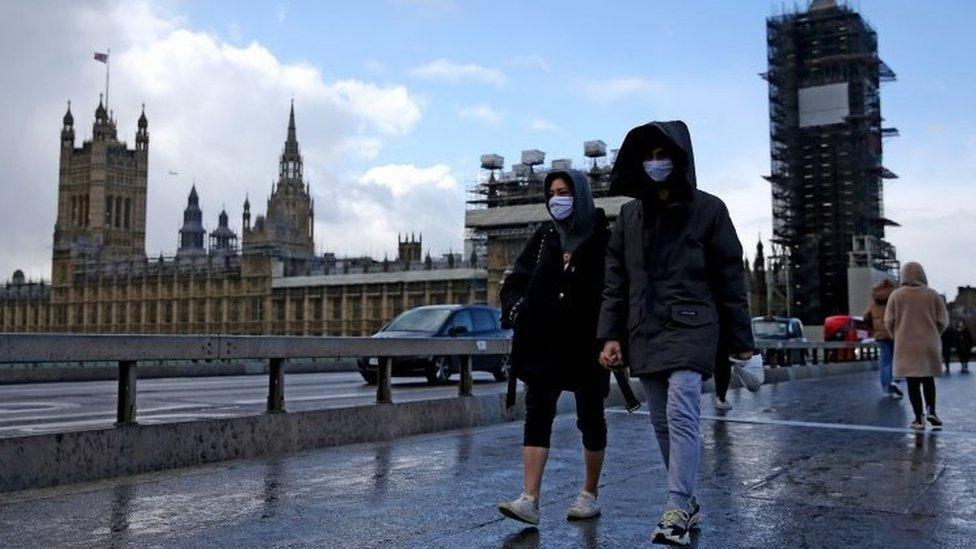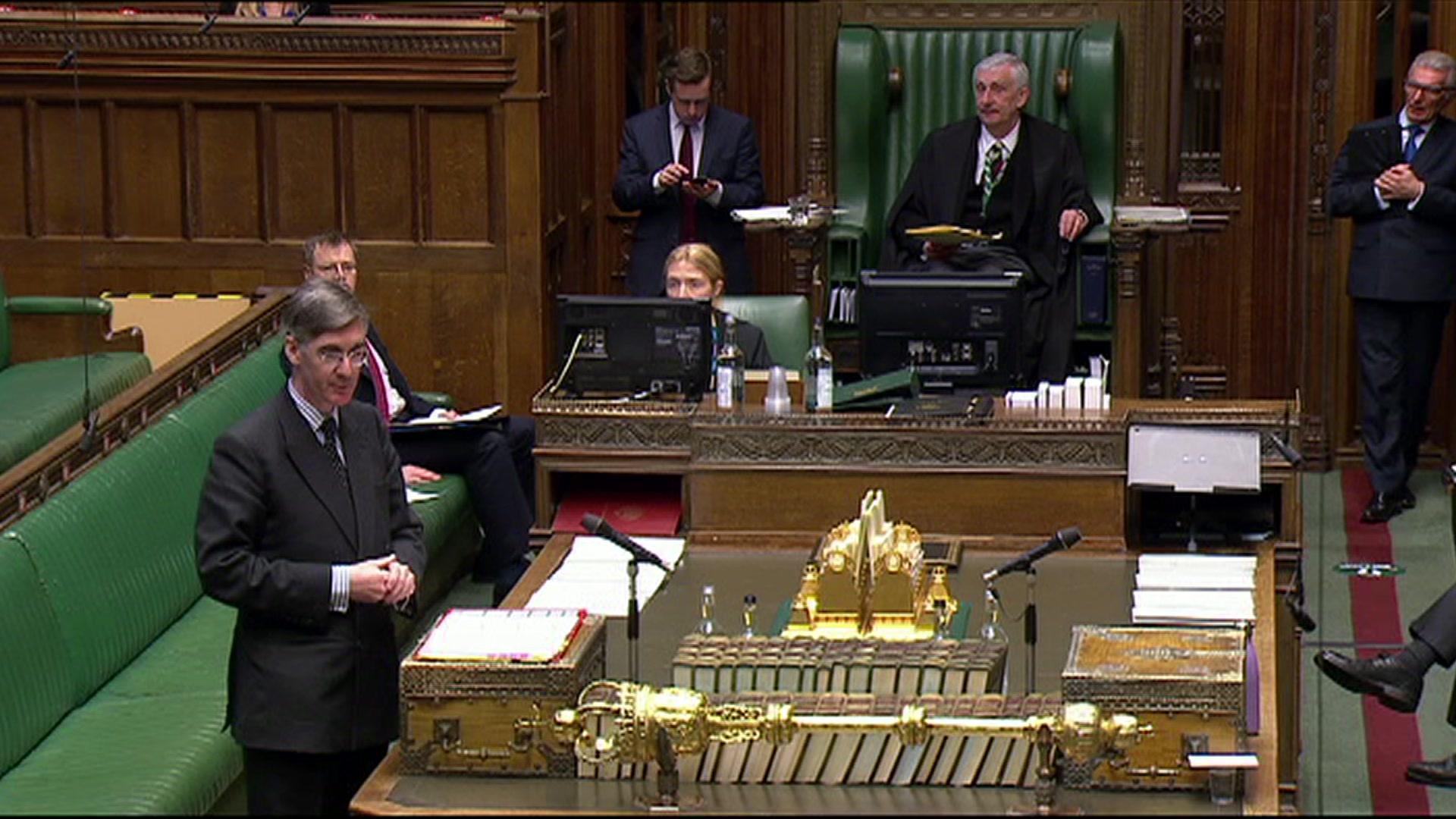Virtual question time was the easy bit... now for the votes
- Published

Virtual questions was the easy bit... now for the votes
It was a bit ponderous, sometimes.
The sound quality was occasionally poor.
And no-one laughed when the Speaker announced that the (former Scottish Secretary) David Mundell was unable to connect.
But the first session of the virtual Commons was a success, with Mr Speaker Hoyle keeping the proceedings moving at a sedate pace, to allow the technical staff behind the scenes time to get the right faces on-screen, when their turn came to ask a question.
The Lords, too, have launched their virtual system, although its first outing was conducted behind closed doors, after a dress rehearsal so chaotic that the House authorities didn't dare let the public watch.
The Lords currently bases its virtual proceedings on the Microsoft Teams system, rather than Zoom, as used by the Commons.
This is because that was the system their Lordships had to hand when the crisis arrived, but it has not proven well-adapted to the requirements of a virtual parliament, and they will eventually switch to Zoom.
In the meantime one official will have the sole function of muting and un-muting peers during virtual sessions, which sounds like a fairly thankless task.
More managed debates
Compared to the normal, glacial, pace of change in Westminster, parliamentary procedure has been moving at warp factor nine.
The question now is whether the 'dilithium crystals' can take much more.
Because, considerable though the achievement of virtual question times has been, that was the easy bit.
Creating a virtual system capable of dealing with the much more free-flowing debate that would normally come when MPs consider the detail of legislation - particularly at Report Stage or Committee of the Whole House - will be rather more difficult.
The kind of thing I mean is where MPs intervene on a minister to ask for a clarification or assurance about a particular point, and maybe rebellion (or even acceptance) crystallises on the floor of the House.
Question times have an established list of questioners; spontaneity, with some MP unexpectedly rising to push a particular issue, is much harder for the Chair to cope with, when they're not in the Chamber.
The chances are that debate will be much more managed and stilted, with MPs having to organise their spontaneity in advance.
Votes cannot be avoided forever
Then comes the question of voting.
For the next week or so the "usual channels" - the parliamentary business managers - will try to avoid divisions, that is to say counted votes, in the House.
So, for example, the Second Reading of the Immigration Bill has been postponed, precisely because that was one measure where MPs would expect to have to troop through the Aye and No lobbies.
Another is the forthcoming vote on allowing abortion in Northern Ireland - a very sore point with the Democratic Unionist Party.
The forthcoming business will be subject to a "nod or nothing" rule, so that if, unexpectedly, someone does oppose it, and seek to force a division, the division will be postponed.
But votes cannot be avoided for ever - and a system to allow remote voting will need to be in place fairly soon.
Trials of a system similar to the kind of thing that happens when people need to change a password on something important like internet banking, have already taken place.
MPs would be emailed a link and texted a code number to allow them to log into a website where they could register their vote for each division.... but, I'm told, there was an 80 per cent failure rate.
Mr Speaker's discretion
Even so, the House has now agreed a motion on remote voting, leaving much to the discretion of Mr Speaker Hoyle.
• There will be the option to make a remote vote a "deferred division" (this would allow votes to be taken in a group at a later time)
• It is up to the Speaker to confirm that a remote vote is applicable
• The technicalities of the remote voting will be "authorised by the Speaker"
• There will be no tellers
• MPs have 15 mins to vote
• The 15 mins can be suspended if the Speaker thinks there are issues
• The Speaker will announce the result from the chair
• MPs can continue with subsequent business before the result is announced - and the Speaker will interrupt proceedings with the result
• The Speaker can rule that the vote is "null and void" and order a re-run if there are "problems in the conduct of the division occurred which might have affected the result"
The nightmare scenario is that the validity of some close vote is challenged because someone's vote was somehow not registered, or even wrongly registered.
The Chair of the Procedure Committee, the former Cabinet Minister, Karen Bradley, didn't push an amendment, delaying the implementation of remote voting to a division.
But she remains to be convinced about the technology.
- Published2 April 2020

- Published21 April 2020

